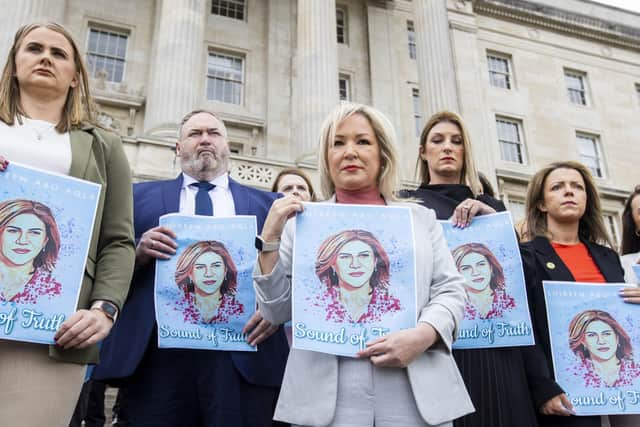Michelle O’Neill: DUP ‘disgracefully holding the public to ransom’
and live on Freeview channel 276
“Today is the day we should be forming an Executive to put money in peoples pockets and to start to fix our health service,” she tweeted.
“The DUP have confirmed they will punish the public and not turn up.
Advertisement
Hide AdAdvertisement
Hide Ad“They are disgracefully holding the public to ransom for their Brexit mess. Shameful.”


But DUP leader Sir Jeffrey Donaldson said he was sending a clear message to the EU and the UK Government over the Northern Ireland Protocol.
Speaking this morning, Sir Jeffrey said: “I am here with my Assembly team today for the first sitting of the Assembly.
“My members will be signing the roll and taking their seats for the first time.
Advertisement
Hide AdAdvertisement
Hide Ad“As I have made clear this morning we have taken the decision not at this stage to support the election of a speaker.
“I believe that we need to send a very clear message to the European Union and to our government that we are serious about getting this protocol sorted out. Because of the harm it is doing, undermining political stability, damaging the agreements that have formed the basis of political progress made in Northern Ireland, to our economy, contributing to the cost-of-living crisis, this matter needs to be dealt with.
“While others sit on their hands we are not prepared to do that. We need decisive action taken by the Government.”
Alliance Party leader Naomi Long said the DUP’s announcement was “frustrating”.
Advertisement
Hide AdAdvertisement
Hide Ad“It’s hugely frustrating, as members of society, that we’re not going to have a Government formed, that we’re not even going to have an Assembly where the basics can be done, like scrutinising ministers who are still in post … It is an incredibly frustrating position that we find ourselves in,” she told BBC Radio Ulster.
Ms Long said the DUP had “considerably less votes” than the other parties combined who were in favour of going back into government.
She also warned DUP leader Sir Jeffrey Donaldson not to “overplay his hand” in negotiations with the UK Government over the Northern Ireland Protocol.
“When you play with fire, you will get burned. We saw this with Brexit where the DUP had influence – they overplayed their hand and they ended up with the mess that we are now in and they’re now asking us all to fix it,” she said.
Advertisement
Hide AdAdvertisement
Hide Ad“They are playing with fire again, because the institutions in Northern Ireland cannot survive in the way they are being abused.
“The people who need these institutions most and who need stability in Northern Ireland are unionists, so I would caution Sir Jeffrey about assuming that, in another election, there will be willing partners to go into government beyond it or indeed willing people to fight a further election.
“We have just had an election. It’s incumbent upon us all to accept the outcome of it and to make it work. That’s our job as politicians.
“I think the DUP is playing a very dangerous game with the institutions and with the future of Northern Ireland.”
Advertisement
Hide AdAdvertisement
Hide AdTaoiseach Micheal Martin said the DUP’s move was “unsatisfactory” and disappointing.
“The people elected an Assembly, the Assembly should meet, and then the Assembly should form an Executive,” Mr Martin said.
“Yes there are issues that unionism has raised with us in respect of the Protocol, but those issues should not prevent the establishment of the Assembly and convening of the Assembly and the formation of the executive.”